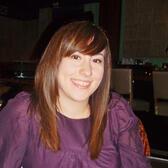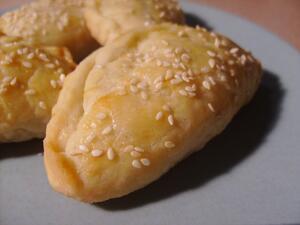Eating Jewish: Borekas
I always said that I was a knish girl. They were my first choice when buying something to eat at the snack bar in elementary school and if they were on the menu at a restaurant there was no doubt that I would order them. However, this all changed recently when I was introduced to the boreka. I was having a conversation about Jewish food (something that seems to happen quite often with most people that sit down to talk to me) with my friend who is Sephardic. When she told me that she preferred borekas to knishes, I was skeptical. I couldn’t imagine another small pie that was better than a knish. Yet she assured me that once I tasted a boreka I would understand. Not giving too much thought to tasting a boreka (and remaining happy with my knish eating ways), a few months went by before anything about borekas was mentioned again. Then one night, my friend and I happened to be studying near a kosher restaurant in Montreal that had borekas on their menu. Insistent that I had to try one, my friend went over to buy me a boreka and it was love at first bite. The dough was flakier and lighter than that of a knish and its potato filling was absolutely delicious.
Borekas are of Turkish origin and are one variety of the many pies that are made within Sephardic communities. Fillings for borekas can include things such as cheese, potatoes, spinach, or eggplant, and they will vary from community to community. Due to the fact that they require time to make, pies such as borekas have usually been made for weddings, bar mitzvahs, the Sabbath and other holidays. In her cookbook The Book of Jewish Food, Claudia Roden explains that Joseph Caro, who wrote the code of Jewish Law the Shulhan Aruch, noted that borekas were part of the Sabbath meal as far back as the sixteenth century. Thus, they have been a mainstay within the Sephardic community for a very long time, which has lent them to being a significant part of memories surrounding food. Two such food related memories include those of Louise Azose, a narrator in JWA’s Weaving Women’s Words exhibit, for whom making borekas was a central part of Shabbat, and Joan Nathan who fondly writes about eating Borekas for breakfast when she was working in Jerusalem in her cookbook The Foods of Israel Today.
Although they are not extremely difficult to make, borekas do require time and practice. I recommend setting aside a morning or an afternoon and inviting some friends over to make these with you. Claudia Roden remembers making these pastries when she lived in Egypt and having the house filled with the laughter and talking of all the women who came to help.
I began by making the potato filling for the borekas, which comes together easily and is extremely flavorful because of the caramelized onions, parsley and turmeric that are mixed in. If you have any leftover filling, you can form the mixture into pancakes and fry them up, eating them on their own as a snack or alongside a salad. I chose to try my hand at making my own dough for these borekas, but you could just as easily use store-bought puff pastry to save a bit of time. The recipe for the dough that I have given below is easy to work with and bakes into a dough that is soft and flaky. However, it wasn’t as light as the dough that surrounds the borekas I usually buy and I’m going to have to try out some other recipes to find one that is perfect.
If you haven’t tried borekas yet, go ahead and make these (it will take some time but they will definitely be worth it). If you’ve already had borekas, then what is your favorite filling? Do you have a recipe for dough that you swear by?
Potato Filling From Joan Nathan’s The Foods of Israel Today
2 medium onions, diced
4 tablespoons butter
2 pounds baking potatoes (about 4 medium potatoes)
Salt and freshly ground pepper to taste
½ teaspoon turmeric (optional)
½ cup chopped fresh parsley (I used a bit less than ½ a cup but you can add the parsley depending on how much you like)
2 large eggs
Dough From Claudia Roden’s The Book of Jewish Food
½ cup sunflower oil
8 tablespoons unsalted butter
½ cup water
½ teaspoon salt
About 3 cups flour
1 egg for brushing the tops of the borekas
Sesame seeds for sprinkling on the borekas
Sauté the onions in 2 tablespoons of the butter until they are golden.
Peel the potatoes, cut them into quarters, and cover with cold water in a large pot. Bring to a boil, then simmer for 15 minutes or until the potatoes are cooked through. Drain and mash them with a fork. Add salt, pepper, onions, turmeric, parsley, the remaining butter, and the eggs. (make sure that that potato mixture has cooled before adding the eggs so the residual heat doesn’t cook them). Mix thoroughly.
Heat the oil and butter in a pan over low heat until the butter melts. Take the mixture off the heat and let cool a few minutes. Add the water and salt and beat well.
Transfer the butter mixture to a bowl and add the flour to it gradually. You just want to add enough to make a soft, greasy dough that holds together in a ball. Begin mixing in the flour with a fork and then work it in with your hands when the dough begins to come together. You don’t want to handle the dough too much, so as soon as it holds together stop mixing. Cover the dough in a plastic wrap and let it rest at room temperature for 20 minutes. Don’t put the dough in the refrigerator because this will make it too hard to work with.
Take walnut-sized lumps and roll each into a little ball. Press and squash the ball between your palms until it’s a flat circle. Put the flat circle on your counter and using your palm stretch and flatten into a 4-inch round.
Put a heaping teaspoon of filling in the middle of each round. Fold the dough over the filling into a half-moon shape. Pinch the edges firmly together to seal the borekas. It is traditional to pinch, fold and twist the dough around the edges of the borekas once they have been sealed (this is a nice touch to add to the borekas but definitely takes some practice!)
Place the borekas on an oiled tray and brush them with the egg that has been mixed with a bit of water. Sprinkle with sesame seeds if you like.
Bake the borekas at 350 degrees for about 30 minutes or until they are slightly golden. Serve immediately.
The borekas are also very good after they have been reheated or they can also be frozen before being baked.








Bourekas will forever remind me of our Sabbatical year in ISrael when we lived in Jerusalem and I used to buy cheese bourekas every chance I got. Every Makolet ( corner store ) makes their own and sells them fresh out of the oven. It was my biggest weakness in Israel that year....My mouth is watering as I write this so I gotta keep it closed to protect my keyboard! Thanks for the memory and the recipes! Debbie in HP, New Jersey
I too love bourekas, especially cheese bourekas. My husband and I were first "introduced" to them when we lived in Israel and would go to a fellow congregant's home after attending the bet knesset on Friday evening. I've been making them ever since, but I use the pre-made frozen dough because I never seeem to find the time to potchkey with preparing them from scratch. For the filling, I mix feta cheese (Bulgarian is especially nice), chopped mint and chopped dill (fresh, if possible), some Parmesan cheese, and an egg white. I also cut the dough into squares rather than circles and after putting a spoonful of the cheese mixture on the dough, I fold it into a triangle. I mix the yolk from the egg with a spoonful of water to "paint" each boureka (so it will come out from the oven with a lovely golden color), and then I sprinkle with sesame seeds. If I make some bourekas with other than cheese, I use a different color sesame seed to distinguish between them. Final note: As I said, I love bourekas, but they don't compare to my late mother's meat knishes!
On my next visit, I will most definitely have some for you Leah (and anyone else at the JWA who would like to try some!)
I have never heard of these before, but I desperately want to try one!!!